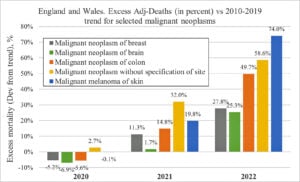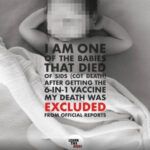Teenagers and young people in their 20s, 30s and 40s in the U.K. are dying from rapidly metastasizing and terminal cancers at an unprecedented rate since mass COVID-19 vaccination began, according to a new analysis by Edward Dowd.
The 45-page report by Dowd, a former Wall Street hedge fund manager and author of “‘Cause Unknown’: The Epidemic of Sudden Deaths in 2021 and 2022,” alarmed some oncologists who characterized it as a sharp reversal of decades of mortality data.
Dowd based his analysis on readily available government statistics from the U.K.’s Office for National Statistics.
In an interview with The Defender, Dowd said he and his research partners, who include a handful of high-level scientists, data analysts and financial experts, examined all International Classification of Diseases, 10th Revision, (ICD-10) codes for cause of death in the U.K. in the study period of 2010-2022 to investigate trends in malignant neoplasms (C00 to C99 codes).
ICD-10 codes are the international physicians’ classification of diagnosis, symptom and procedure for claim processing set by the World Health Organization (WHO). A malignant neoplasm is a cancerous tumor.
Dowd said his research team noticed a striking pattern: While almost all deaths among older people in 2021 and 2022 in Wales and England had been coded, 8% of deaths among 15- to 44-year-olds in 2021, and 30% of deaths in that age group in 2022, hadn’t yet been coded.
“When you die in a hospital, you leave a trail of life and death with indications of what led to the death,” he said. “When a young person dies at the wheel of a car, walking down the street or in their sleep, there’s an investigation” that consumes time to assign the cause of death.
Dowd said the missing codes are “indicative of the problem” of excess deaths among young people.
But even with the caveat of missing codes, he said, the remaining 92% of coded deaths in 2021 and 70% of coded deaths in 2022 revealed “a strong signal of cancer deaths in the young. We show a large increase in mortality due to malignant neoplasms that started in 2021 and accelerated substantially in 2022.
“The increase in excess deaths in 2022 is highly statistically significant (extreme event),” Dowd wrote in his report. “The results indicate that from late 2021 a novel phenomenon leading to increased malignant neoplasm deaths appears to be present in individuals aged 15 to 44 in the UK.”
The study’s results in the rate of cancer deaths above the historic norm in 2022 for ages 15-44 in the U.K. included:
- A 28% rise in fatal breast cancer rates in women.
- An 80% increase in pancreatic cancer deaths among women and a 60% increase among men.
- A 55% increase among men in colon cancer deaths and a 41% increase in women.
- A 120% increase in fatal melanomas among men and a 35% increase in women.
- A 35% increase in brain cancer deaths among men and a 12% rise in women.
- A 60% increase in cancer death rates among men in cancers “without site specification” and a 55% increase among women.

‘Mounting clinical evidence’ led to study
Dowd produced his report, assembled by Carlos Alegria, one of Dowd’s partners, in his Humanity Projects study of excess deaths in the U.K. and the U.S. using government and insurance industry data.
He said he started his pro bono data-driven project to help guide public policy when he saw how COVID-19 pandemic policies were destroying society’s faith in institutional experts.
Surveying the capture of national and state government regulatory agencies and corporate media by Big Pharma and other global interests, he realized, “We need independent agents to act as gatekeepers of the public interest.”
“We intend to be such agents, and to provide high-quality research to other individuals and institutions who seek similar outcomes,” he wrote.
The new report is his third in the UK Cause of Death Project, which previously examined “UK – Death and Disability Trends for Cardiovascular Diseases, Ages 15-44,” and “UK – Death Trends for the Cardiovascular System, Ages 15-44, Analysis of Individual Causes.”
The mounting clinical evidence linking burgeoning cancers in young people to the COVID-19 vaccines led Dowd to his latest study, he said.
“We focus our research on younger individuals, aged 15-44, as presently it is a topic of particular interest due to the rise in anecdotal evidence of many unexplained aggressive and unusual cancers (such as turbo cancers … ) occurring in the population, particularly in younger individuals,” he wrote in the study.
“The focus of this study is not to examine individual claims and anecdotes, but instead to provide a statistical analysis at a population level and clarify if the anecdotal evidence is abnormal or not.”
Dowd said he hopes “the relationships that we uncover in our analysis” are “a basis for a reality check for health professionals to understand underlying trends in individuals’ health.”
Dowd’s method was to analyze the number of deaths attributed to cancer in England and Wales between 2010 and 2022 in the U.K. Office for National Statistics data.
He compared excess death rates, the difference between observed deaths and the baseline for expected deaths, before and after the COVID-19 pandemic.
He established a baseline of normal cancer death rates from 2010-2020 that was remarkably consistent with few deviations, he said — until the cancer death rates rose significantly in late 2021 in the U.K. following the vaccine rollout.
Key findings from the report include:
- Breast cancer dominates in women. The most common cause of fatal cancer in women, ages 15-44, is breast cancer, representing about 25% of the total excess death rate caused by malignant tumors in women in 2022. The next most dangerous cancers for women, based on excess death rates, were colon cancer and cancer of the cervix uteri.
- While fatal cancer deaths rose dramatically among both young men and young women in 2022, young men saw a disproportionately higher rise in cancer deaths, but with no dominant cancer comparable to breast cancer in women. Brain cancer, colon cancer and stomach cancer accounted for 30.9% of the rise in fatal cancers in men in 2022.
- Cancers “without specification of site,” indicating rapid metastasis to other organs and commonly called “turbo cancers,” “exploded” in 2022, Dowd said. “These cancers saw very large rise in both women (in 2021 and 2022) and men (in 2022) and were likely metastasized already once they were identified. As the individuals refer to younger individuals who do not require early screening, these cancers were likely of rapid growth.”
- Men experienced a huge rise in skin cancer death rates of 118% in 2022. “Even though these cancers do not account for a large proportion of all cancers,” Dowd said.
- Cancers of the digestive tract “saw explosive changes in 2021 and 2022 relative to the 2010-2019 trend,” Dowd wrote. “Of particular notice are cancers of the colon (internationally coded as C18), stomach (C16) and esophagus (C15). “These cancers related to the digestive tract appear to have risen substantially in importance, and we also notice that they seem to be affecting men in a disproportionate manner.”
- Pancreatic cancer “saw a very large rise in both women (in 2022) and men (in both 2021 and 2022). Why these cancers rose so dramatically and why they rose first in men then women is one of the questions that we believe warrants investigation.”
Dowd emphasized that his research was “a first attempt to bring out some patterns that are observed in trends” in cancer post-2020.
“We hope that medical doctors and specialized researchers perform further investigations based upon these (and other) insights that our data analysis provides,” he wrote.
Link between COVID shots and rise in cancers ‘worth looking at’
Dr. Chris Flowers, an academic physician, radiologist and breast cancer specialist in England who came out of retirement to be the volunteer scientific lead of the War Room/DailyClout Pfizer Documents Analysis Project, told The Defender the U.K. data were “very, very, concerning.”
Flowers said Dowd’s research confirmed similar data on sharp cancer death increases reported by researchers, clinicians and cancer specialists in the U.S., U.K. and across the Western industrialized world since the global rollout of the experimental Pfizer and Moderna mRNA vaccine. An estimated more than 5.55 billion people, or about 72.3% of the global population, received the shots.
Flowers said he and his colleagues, including pathologists, radiologists, oncologists, internists, critical care doctors and researchers in the U.S. and U.K., have never seen anything like the severity of fatal breast cancers and other cancers in the young that exploded in 2022.
Dowd’s report confirms what Flowers and his colleagues have noticed for more than a year: “We’re seeing 2 or 3 times the normal rate of cancer.”
“We’re seeing younger people, we’re talking 20- and 30-year-old women, usually after they started menstruating and some form of growth promoter is going on normally, presenting with advanced tumors which are difficult to treat, but also they may have more than one tumor,” Flowers said. “Something that was rare is now relatively common.”
Perhaps most distressing, Flowers said, is the rise in the young of what some oncologists now call “turbo cancers,” a new term.
“Turbo cancer is a popular name that’s been coined to describe several things,” Flowers said. “It is cancers in young people just turning up, one day you’re absolutely fine, the next day you’re told you have terminal cancer and you’re dead in a week. There are many reports of that even in the mainstream media.”
“Tumors are not only faster growing but you’re getting more types of cancer occurring in the same person. It used to be very very rare. Just occasionally I’d see a very, very aggressive inflammatory cancer in young people. But now everyone has stories.”
Dr. Pierre Kory, a pulmonologist and critical care doctor who is president and medical director of the Frontline COVID-19 Critical Care Alliance (FLCCC) and treats hundreds of vaccine-injured patients in his practice, said he is “being deluged with reports and consults for help” about cancer increases from colleagues and patients.
David Wiseman, Ph.D., a pharmacist with a doctorate in experimental pathology and a pioneer, originally for Johnson & Johnson, of products to prevent post-surgery internal injuries, said he was alternatively astonished and outraged that governments and mainstream media won’t follow up on research he and Kevin McKernan, a former director of research and development at the MIT Human Genome Project, conducted showing the mRNA shots were contaminated with DNA fragments.
These fragments, Wiseman said, add to the potential damage the vaccines could cause to the human genome and open new doors to an infinite variety of problems, including cancer.
Wiseman told The Defender that the Centers for Disease Control and Prevention’s (CDC) own data show cancer concerns connected to the COVID-19 vaccines.
“We’re seeing an increase in cancers in VAERS,” the official U.S. Food and Drug Administration and CDC site for reporting vaccine injuries, Wiseman said. “The CDC did a PRR analysis, a signal analysis, that found a signal for cancer in the vaccines, which isn’t proof but it means it’s worth looking at.”







